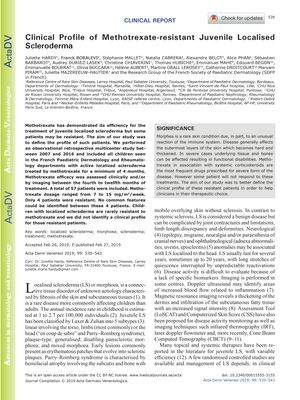Clinical Profile of Methotrexate-Resistant Juvenile Localized Scleroderma
January 2019
in “
Acta dermato-venereologica
”

TLDR Some children with localized scleroderma are rarely resistant to methotrexate, and no common profile for resistance was found.
The study, which included 57 children with active localized scleroderma treated with methotrexate (MTX) for at least 4 months, found that only 4 patients (7%) were resistant to MTX treatment, and no common clinical profile could be identified among these resistant patients. Despite exploring potential reasons for MTX resistance, such as insufficient dosage and individual pharmacokinetic variations, the study concluded that children with localized scleroderma are rarely resistant to MTX. It also suggested that higher dosages of MTX and the inclusion of corticosteroids might be worth investigating in future research to better understand and manage MTX resistance in juvenile localized scleroderma.




